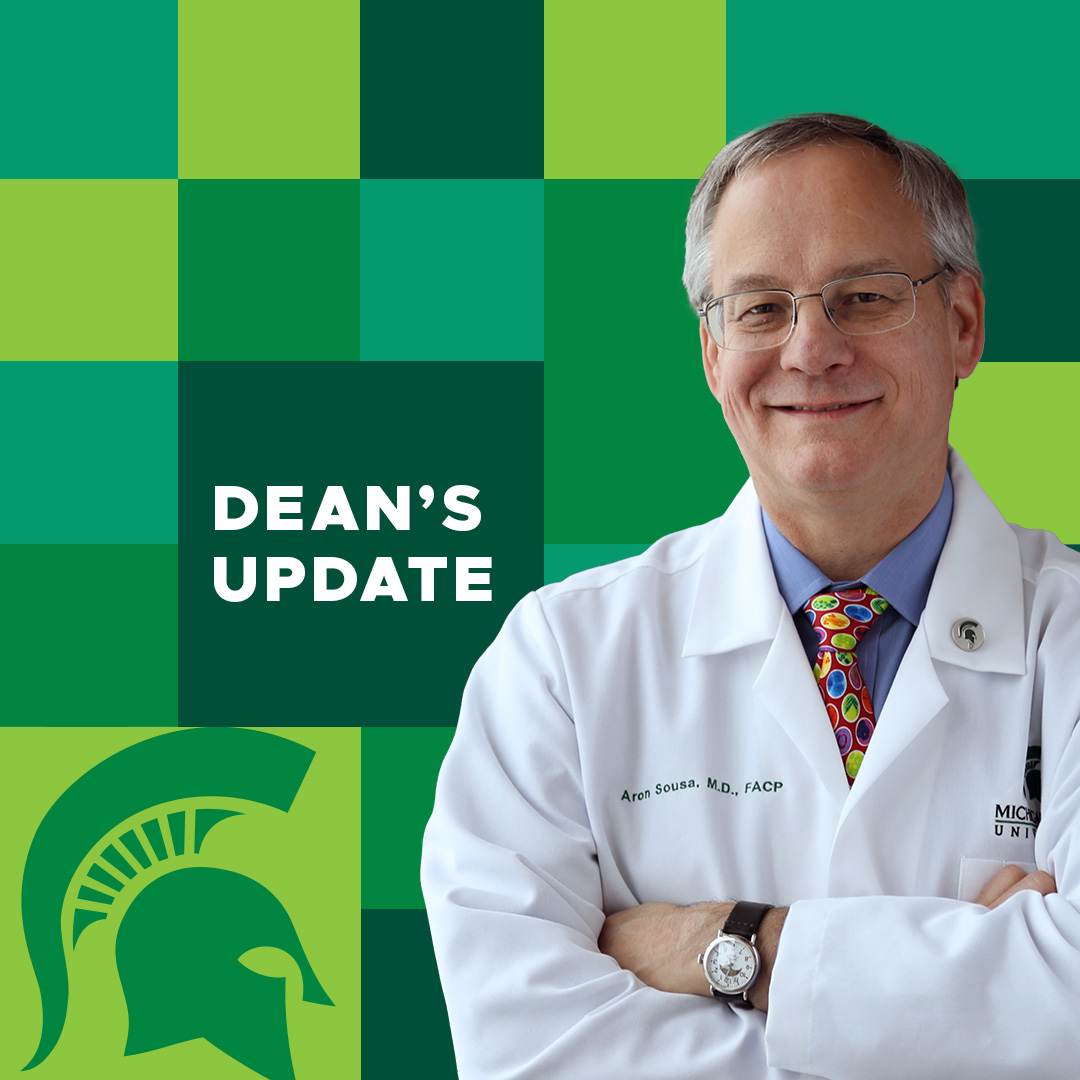Dean's Update
April 18, 2025 - Aron Sousa, MD
 Friends,
Friends,
Just days after I made an off-hand comment in the Update about being fitted for an N95 mask and the national outbreak of measles, Ingham County reported its first measles case since 1994. That last case was a generation ago, and a few years before the WHO declared measles eradicated from the U.S. in 2000. One case is not a local epidemic, but measles is one of the most communicable viruses. People with measles can be infectious for four days before the traditional rash appears and four or so days after the appearance of the rash. It spreads via small respiratory droplets that can hang around in the air for over an hour and be picked up by susceptible people through their respiratory system and eyes.
This case is an example of how this disease can spread. According to press accounts, this young patient was one of hundreds of people exposed at Michigan airports at the end of March. She had been vaccinated with the MMR just the day before her trip and her exposure, but immunity takes a couple of weeks to fully develop. As we know, measles can be a serious disease. Fortunately, she is doing well, isolating at home, and has a mild case likely attenuated by her recent immunization.
Furthermore:
- We continue to manage the fallout from the federal attack on science. The college is working on a bridging program using some discretionary philanthropy funds, and we will communicate with departments soon about this effort.
- About 100 principal investigator faculty and their research teams have grants in limbo. We have one large program that we know has been funded by Congress, but there is no one left in that CDC section to answer the phone. We literally cannot find anyone to talk to there. It is remarkably poor service and incredibly inefficient.
- This week the university president announced the new One Health Council. Communication about the effort has been from the president’s office, and you can find his messages, the membership of the council and task forces, and other important information at the health sciences website.
- Check out the university’s Research for You landing page. This page is a nice way to see the impact of science and scholarship for the good of people in Michigan and around the world. The whole point of land grant universities, like Michigan State University, and community-based medical schools, like the College of Human Medicine, is to bring knowledge and innovation to the people of Michigan and the rest of the world.
- Dr. Mona and the Rx Kids team have been busy bringing their common sense approach to improving health in communities across the state. The maternal and infant cash prescription program started in Flint, and has already rapidly spread (like measles, but a better kind of viral) to almost every corner of the state. Catch up with their work in Dearborn, Ypsilanti, St. Ignace, Kalamazoo, and Pontiac. With so much excitement for the program, the Michigan legislature has proposed Rx Kids for every baby in Michigan!
Finally, our Charles Stewart Mott Department of Public Health in Flint is celebrating earning $200 million in external funding since we started the unit in the earliest part of 2015. That number does not include the $36 million in origin grants from the Charles Stewart Mott Foundation across two awards: first creating the unit and then a second establishing the Charles Stewart Mott Department of Public Health as the first philanthropically named department in the university’s history. This is the fastest research funding growth of any of our college’s expansions. The success is due to our collaboration with the people of Flint, who have brought their expertise, talent, energy, and grit to developing, building, and co-governing the department itself as well as to every collaboration with our students, faculty, and staff. As collaborators we have saved lives from suicide and cancer, educated kids, helped people address addiction, improved mental health, improved maternal and infant health, advanced health equity, arranged neuropsychological testing, linked lead in water to lead in kids, created healthier cities, increased green space, reduced racial disparities in COVID and other diseases, reduced child poverty, reduced violence, implemented care improvements around the state and country, trained providers, created a food prescription program that is now a national program, improved mental health service systems for our most vulnerable, educated medical and graduate students, and trained physicians in residency and fellowship. Whew.
We should take a moment to recognize and celebrate that the department, college, university, Mott Foundation, and the people of Flint looked each other in the eye, put their shoulders to the wheel in the home city of American industry, and went to work. There are plenty of reasons to worry about the next months, but for now, what we have done is more than enough reason to be happy.
Serving the people with you,
Aron
Aron Sousa, MD, FACP
Dean, Michigan State University College of Human Medicine

